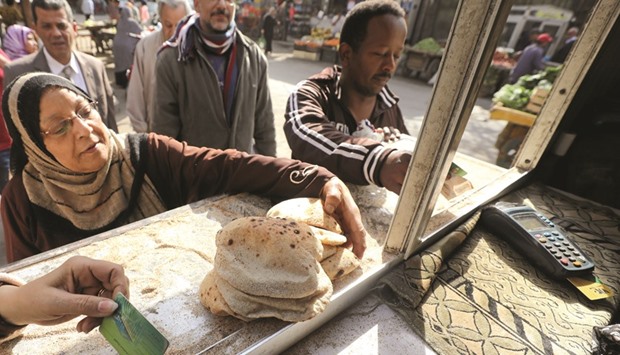Egypt’s efforts to ease a crippling economic crisis, including floating the pound and cutting subsidies, are showing signs of success. Foreigners are investing again in stocks and local-currency debt, and dollars are becoming more available.
But in many areas, the benefits of policies that helped to secure an International Monetary Fund loan are not yet apparent. There are early signs of unrest on the streets as prices surge, while tourists still put off by political upheaval and terrorist attacks are yet to return in their previous numbers.
Below are some of the challenges still facing policy makers.
Stability
The government of President Abdel Fattah al-Sisi has avoided a major backlash against its policies, in part because it cracks down on dissent. Limited protests last week against lower bread subsidies illustrate the potential for instability. Problems facing the poor - especially soaring prices - may provide a rallying point before next year’s presidential election, said Hani Sabra, head of the Mideast practice at New York-based Eurasia Group.
“Al-Sisi is almost certain to win,” Sabra said. “But the election does offer the disparate disaffected factions in Egypt the opportunity to coalesce around an idea or a person.” Opposition has been held largely in check because “various groups that feel alienated by al-Sisi’s government aren’t collaborating” and authorities have significant power to break up opposition, he said.
Tourism
The number of people visiting Egypt climbed to a record 14mn a year before the 2011 Arab Spring uprising, generating more than $12bn in revenue. The industry was hit again when a jet carrying Russian tourists was bombed over the Sinai desert in 2015.
Though tourism revenue picked up slightly in December, it was still 16% lower than the same month a year earlier, according to local media reports. Russian authorities have been reviewing security at Egyptian airports for months and have promised that a travel ban imposed since the bombing will be lifted soon. Denmark and other Nordic countries have also reversed their earlier advice to avoid travelling to Egypt’s beach resorts in South Sinai.
Inflation, growth
The pound has weakened by about 50% since the November 3 float, helping to send the inflation rate above 30% in February. That’s hurting incomes and forcing Egyptians to spend more of their incomes on basic necessities. Though the inflation rate is expected to fall, it will remain high as the government pushes through more subsidy cuts over the next three years, said Reham ElDesoky, senior economist at Dubai-based Arqaam Capital. Economic growth will have to come from investment until consumer demand recovers.
Exports
While a weaker pound should help exporters, parts of Egyptian manufacturing are highly dependent on imports - partially offsetting the benefits of a devalued currency, according to ElDesoky. Exporters also have limited capacity to expand and face significant red tape, she said.
Fourth-quarter exports rose 18% to $5.2bn, the central bank has said. The Emirates NBD Purchasing Managers Index showed an improvement in the non-oil private sector in February, as business optimism and export orders start to recover.
Foreign investment
Egypt attracted $4.3bn from July to December compared with $3.1bn in the same period a year earlier, as investments in the oil sector rose. The IMF expects FDI to pick up to $9.4bn in the current fiscal year and to gradually grow to $12.9bn by 2021. For that to happen, Egypt has to address major investor concerns related to repatriation of profits, exchange-rate volatility and political risk, according to Radwa El-Swaify, head of research at Cairo-based Pharos Holding. Lower consumer demand, a key growth driver that has sustained Egypt since 2011, also hurts Egypt’s attractiveness to investors, she said. While analysts say a period of exchange-rate volatility was inevitable following the float and officials are taking steps to clear the profit-repatriation backlog, “sceptical investors” are watching these issues very closely, El-Swaify said.

People buy bread at a bakery in Cairo on March 9. The pound has weakened by about 50% since the November 3 float, helping to send the inflation rate above 30% in February. That’s hurting incomes and forcing Egyptians to spend more of their incomes on basic necessities.
